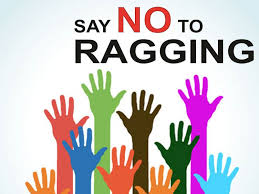Objectives of the Anti-Ragging Cell
- Monitor and Prevent Ragging: Keep watch and put an end to any instances of ragging that may occur or be reported in areas where teacher-students congregate, such as classrooms, canteens, buses, and common areas.
- Spread Awareness: Use a variety of methods to spread awareness among all students about the dangers of ragging and the associated punishments.
- Safe Environment: Create an environment where student teachers can develop their personalities without fear of harm.
Definition of Ragging (As per Supreme Court of India and UGC Notification)
- Disrespect or Teasing: Any act of disrespect, teasing, or rude handling.
- Academic Disruption: Any act that prevents or disrupts regular academic activity.
- Psychological Harm: Any activity likely to cause annoyance, hardship, psychological harm, or creates fear or apprehension.
- Financial Extortion: Any act of financial extortion or forceful expenditure.
- Physical Abuse: Any act of physical abuse causing assault, harm, or danger to health.
- Verbal Abuse: Any act of abuse by spoken words, emails, SMS, or public insult.
- Infringement of Dignity: Any act of injury or infringement of the fundamental right to human dignity.
- Wrongful Acts: Any act of wrongful confinement, kidnapping, molesting, committing unnatural offenses, use of criminal forces, trespass, or intimidation.
- Unlawful Assembly: Any unlawful assembly or conspiracy to rag.
Punishments for Those Found Guilty of Ragging
Students or groups of students found guilty of ragging, whether on or off-campus, will be subject to one or more of the following penalties:
- Loss of College Perks: Removal of all college perks.
- Exam Prohibition: Forbidding from taking any sessional exams or university examinations.
- Class Attendance Ban: Disallowance from attending classes and academic privileges.
| Members | Name |
| Chairperson | Dr. Priyanka Pandey (Principal) |
| Co -ordinator | Asst. Prof. Sanabano Shaikh |
| Student incharge | Mrs Lavita chettiar |
| Chairperson | Dr. Sneha Raikar |
| Co-ordinator | Ms. Manisha Sonavane |
| Faculty in charge | Dr. Munnazza Afreen |
| Student member | Ms. Shrishti Dhing |
Objectives of the Anti-Ragging Cell
- Monitor and Prevent Ragging: Keep watch and put an end to any instances of ragging that may occur or be reported in areas where teacher-students congregate, such as classrooms, canteens, buses, and common areas.
- Spread Awareness: Use a variety of methods to spread awareness among all students about the dangers of ragging and the associated punishments.
- Safe Environment: Create an environment where student teachers can develop their personalities without fear of harm.
Definition of Ragging (As per Supreme Court of India and UGC Notification)
- Disrespect or Teasing: Any act of disrespect, teasing, or rude handling.
- Academic Disruption: Any act that prevents or disrupts regular academic activity.
- Psychological Harm: Any activity likely to cause annoyance, hardship, psychological harm, or creates fear or apprehension.
- Financial Extortion: Any act of financial extortion or forceful expenditure.
- Physical Abuse: Any act of physical abuse causing assault, harm, or danger to health.
- Verbal Abuse: Any act of abuse by spoken words, emails, SMS, or public insult.
- Infringement of Dignity: Any act of injury or infringement of the fundamental right to human dignity.
- Wrongful Acts: Any act of wrongful confinement, kidnapping, molesting, committing unnatural offenses, use of criminal forces, trespass, or intimidation.
- Unlawful Assembly: Any unlawful assembly or conspiracy to rag.
Punishments for Those Found Guilty of Ragging
Students or groups of students found guilty of ragging, whether on or off-campus, will be subject to one or more of the following penalties:
- Loss of College Perks: Removal of all college perks.
- Exam Prohibition: Forbidding from taking any sessional exams or university examinations.
- Class Attendance Ban: Disallowance from attending classes and academic privileges.












